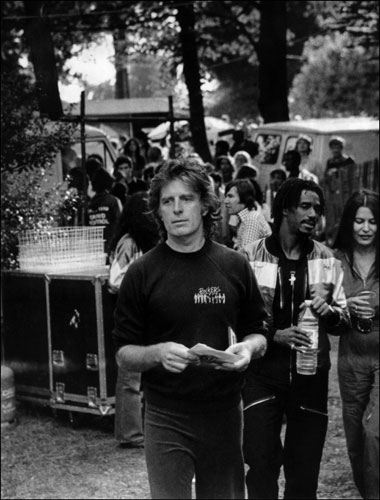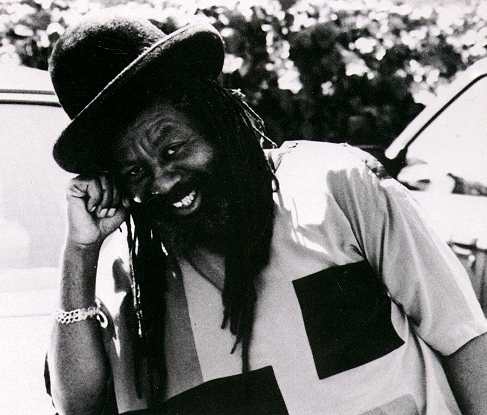Note to Reader: I'm going to attempt to reconstruct the journal I began way back in 2009 on the golden age of reggae. The links to all of the songs in the journal were cut off by YouTube over a dispute I had with them over the fair use of intellectual property back in 2011. It's now two and half years later (2014) and I won the dispute, and I'm allowed to post music on You Tube again. Over the next couple of weeks I'm going to attempt to reconnect all of the original links from The Golden Age of Reggae & perhaps revive the journal with some new posts. Below is a copy of the original post I opened the journal with in 2009.
--------------------------------------------
The Golden Age of Reggae
Historical Background
The "Golden Age of Reggae" is a term I've used to cover the era from roughly 1973 until 1986 which was the era when roots reggae, dub and dancehall were in their prime. It's also the era when reggae music went international and reggae musicians like Bob Marley, Jimmy Cliff, Burning Spear. Peter Tosh, U-Roy, Gregory Isaacs, Steel Pulse and Culture brought reggae music to the attention of people all over the world.
Reggae music didn't really exist before 1970 when the Wailer's drummer Carlton Barrett developed the slower one-drop drumming riddim that distinguished reggae music from faster ska riddim. During the next 2 or 3 years other Jamiacan drummers, most notably, Horsemouth Wallace and Sly Dunbar adopted the one-drop riddim and by then end of 1972, this distinctive one-drop riddim music with a Rastafarian consciousness became known as "reggae" all over Jamaica.
 Chris Blackwell in the late Seventies
Chris Blackwell in the late Seventies
Chris Blackwell and Island Records changed everything. Blackwell, a British national Jamaican citizen founded Island Records. Island Records was the most successful indie rock label of the 60s. Blackwell signed such rock stars as the Spencer Davis Group, Traffic, Fairport Convention, King Crimson, and Emerson Lake and Palmer to Island Records.
As a sideline, Blackwell had been recording ska music in Jamaica since 1959 and Blackwell became the most prominent figure in the rise of reggae. Blackwell founded Trojan Records to distribute ska music in the UK where it developed a small but devoted following among West Indian expatriates and a youthful audience of skinheads and mods. Because of his involvement in early ska music scene, Blackwell became the most prominent promoter of reggae music outside of Jamaica almost by default. His only competitor was Richard Branson, another British national who was scouting Jamaica for reggae talent for his newly founded Virgin Records.
In 1973 Blackwell's Island Films released the theatrical film
The Harder They Come, and in the same year Island Records released Bob Marley and the Wailers' first globally distributed major label album,
Catch A Fire. Both the film and the album marked ground zero in the rise of reggae music to international prominence. Few people outside of Jamaica knew what reggae music was before
The Harder They Come and
Catch A Fire were released.
Reggae music received even wider international attention when Eric Clapton recorded a version of Marley's song
I Shot the Sheriff on his 461 Ocean Blvd. album a year later in 1974. Clapton was still the most influential rock guitarist of that era and he served as a gateway to introduce the music of Bob Marley to millions of rock music fans all over the world.
 Bob Marley
Bob Marley
Roots reggae music was at it's peak between 1977 and 1982 when Bob Marley and the Wailers, Burning Spear and Peter Tosh were doing extensive American and European tours and the newly arrived punk music scene began to incorporate the one-drop and dub effects of the reggae idiom into their highly stylized rock music. The Clash produced the
Black Market Clash extended play single with dub oriented producer Mikey Dread at the controls, Public Image experimented with dub on their Metal Box album and the Specials founded 2-Tone Records and began recording like minded ska and reggae oriented groups like the English Beat, Madness and the Selector.
I was a big fan of punk and the 2-Tone bands but I spent most of the early 80s ingoring "new wave" music and listening to dub music and the early dancehall deejays, like U-Roy, I-Roy, Big Youth and Mikey Dread. My biggest reggae hero was, and still is the mighty U-Roy who created the dancehall style during the ska era, became the first reggae (and still the best) reggae dancehall deejay and is currently an influential force on the electronica scene with his Love Trio In Dub group.
 U-Roy
U-Roy
It's all too easy to say that the decline of reggae began with Marley's death in 1981, however Bob's presence was a central force in maintaining the socially conscious integrity of roots reggae.
Ironically it was the success of reggae that contributed to it's decline. The Jamaican deejay music and dub music became a big influence on the rising American hip hop and rap music scene, in the late Seventies. As a result, reggae producers began experimenting with different tempos and began adding synthesizer tap loops to dancehall music. Roots reggae was mutating into a form of tropical hip hop. As hip hop went international, the one-drop riddims of real roots reggae got lost in the mix.
The "Golden Age" ended around 1986 with the rise of the 165 beats per minute of the sleng teng riddim and the increasing prominence of the dancehall deejays who toasted in the boastful and misogynistic slackness deejay style instead of the roots consciousness style of the early deejays like U-Roy, I-Roy and Big Youth. Slackness is a Jamican term for rude boy behavior.
There really hasn't been a significant international roots reggae star to emerge from Jamaica since the early 80s. The elder statesmen U-Roy is now 71 years old, Burning Spear is 67 years old and the last young turks of the early 80s dub music movement like U-Brown & the Mad Professor are now in their middle aged 50s.